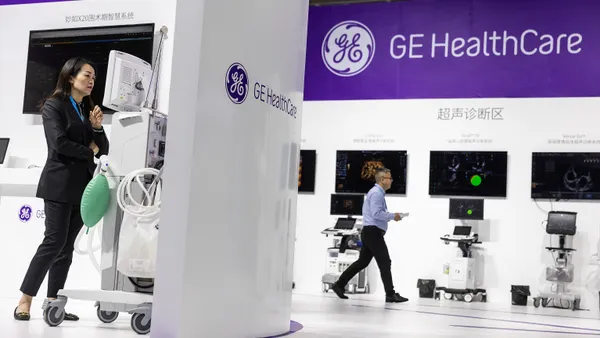Dive Brief:
-
The government is set to pay General Motors and Philips a total of $1.1 billion for 73,000 ventilators under the Defense Production Act invoked by President Donald Trump. HHS said it expects to receive around 8,600 ventilators from the manufacturers by the start of June, with more to follow later in the year.
-
The agreements with GM and Philips, detailed Wednesday, come nearly two weeks after Trump invoked the Korean War-era law in order to "require" the automaker to "accept, perform, and prioritize federal contracts for ventilators" in response to the outbreak of the novel coronavirus.
- Separately, Medtronic said it is making progress on boosting production of its portable Puritan Bennett 560 ventilator, which won FDA emergency use authorization, and hopes to have it on the U.S. market as early as May with an average price of less than $10,000. The company is also working with Intel on experimenting with a remote monitoring capability for another ventilator in two U.S. hospitals.
Dive Insight:
Industry has been prodded to ramp up production of the often large, complex and pricey breathing devices barely mentioned in company financials before the pandemic.
The DPA, which dates back to 1950, gives the American president the power to force companies to make certain products. With the COVID-19 outbreak stretching healthcare resources, Trump has invoked the act several times over the last two weeks to get a handful of companies to step up their production of ventilators.
HHS has now revealed what that will mean in practice. Philips received the larger of the two contracts disclosed to date. HHS will pay Philips almost $647 million to supply 43,000 ventilators to the Strategic National Stockpile by the end of the year. Philips is scheduled to ship 2,500 ventilators by the end of May.
The Dutch company has faced some criticism for government subsidies it received to make less pricey ventilators.
Philips said it plans to "invest several tens of millions" in its U.S. manufacturing sites with a view to doubling production by next month and achieving a four-fold jump in output by the third quarter. Philips has shipped "several thousand ventilators" to the U.S. so far this year. The shipments included a batch of ventilators sent to a New York hospital.
GM, which is working with Ventec Life Systems on ventilator production, is set to receive $489 million from HHS in return for shipping 30,000 devices to the national stockpile by the end of August. HHS expects to receive the first 6,132 devices by the start of June.
The timing of the orders means the vast majority of the ventilators are likely to become available after the coronavirus outbreak peaks in current hotspots such as New York. However, the contracts will ensure the U.S. is better equipped to cope in the event of a second surge in COVID-19 cases later in the year.
More deals are in the works. In disclosing the agreement with Philips, HHS said other companies covered by the invocation of DPA will receive contracts "in the coming week." The invocation covered GE, Hill-Rom, Medtronic, ResMed, Philips and Vyaire Medical.
However, a Philips spokesperson told MedTech Dive "there are differences between the DPA situation for GM" and his company, referring to the fact that Trump invoked the law late last month to compel the automaker to accept, perform and prioritize federal contracts for ventilators.
At the same time, the spokesperson emphasized the DPA executive order issued by Trump last week "relates to the supply chain of Philips and five other ventilator makers" which is meant to remove obstacles to their accessing parts and materials needed to ramp up production of the breathing devices.
The medtech industry was resistant to the use of DPA, with AdvaMed CEO Scott Whitaker arguing that moving forward without the invocation of the emergency power was the "best course of action" late last month. By then, companies covered by Trump’s action were already prioritizing ventilator production, with Medtronic stating weeks ago it would manufacture the devices around the clock.
Across several of its ventilator models, Medtronic said by the end of next month it expects to be making more than 700 ventilators weekly, with a target of 1,000 ventilators weekly by the end of June. That would be a five-fold increase compared with production before the pandemic.
Medtronic also gave details on its work with Intel and two U.S. hospitals on remote capability for its 980 ventilator, aimed at helping clinicians avoid unnecessary contact with patients with the highly infectious disease.
"If the feature is well received, the limited market release will be expanded to other U.S. customers later in April," according to a company statement.











